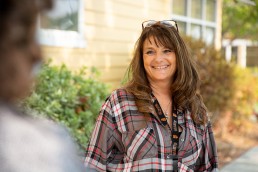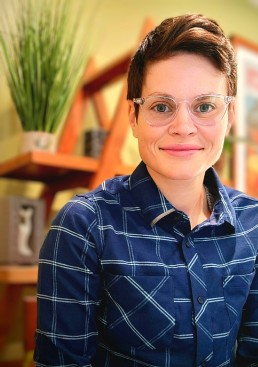As COTS’ CEO, each month I take a moment to consider what I want our community to know about our organization and our progress in serving Sonoma County’s homeless. I look forward to sharing these thoughts with you in this Virtual Cup of Coffee – my monthly communique about the business and mission moments of COTS (Committee On The Shelterless).
My best,
Chuck

Transitions at COTS
We are going through two major transitions at COTS that will significantly improve how we serve those experiencing homelessness.
The first is our entry into Medi-Cal through the CalAIM program (California Advancing and Innovating Medi-Cal). CalAIM is expanding services available to some of the most vulnerable populations in California, including those experiencing homelessness. The intent is to meet the unsheltered and sheltered where they are – on the streets, in encampments, living in their car, or in a shelter – and then collaborate with health centers to provide services such as enrolling them into Medi-Cal, an appointment with a primary care provider, helping develop a care plan, and hopefully getting them stably housed. California is investing billions of dollars into CalAIM as part of their solution of offering a more equitable, coordinated, and person-centered approach to health care delivery. We are going to serve our clients through a whole new discipline – a medical model.
The second transition is a stronger focus on getting people housed. Thanks to a continued collaboration with our respected partners in Novato, Homeward Bound of Marin, we are moving from a traditional Emergency Shelter to a Housing Focused Shelter. Homeward Bound has an impressive 70% exit rate from their shelters into permanent supportive housing. That means when someone enters our shelter, our expectations are made clear immediately – “you are here to get housing – this is not a free hostel. If that doesn’t work for you, then this is not the place for you.” Then together, we will create a housing plan, and residents will have to meet with their housing case manager weekly. Accountability to their plan is key to staying in the shelter. Getting housing becomes a shared responsibility, but our housing case managers will not work harder than or do all the work for our residents. It’s their responsibility to get housing, and we will help them. This new approach empowers our team, and they are very excited about the possibilities. We are also aligning this new approach with the City of Petaluma’s Strategic Action Plan to End Homelessness and their Pathway to Housing.
We have a responsibility to our community to get people off the streets and into housing. Getting people stably housed is also a big part of their health care plan. And with these two transitions, we believe we can end homelessness.
These transitions won’t be easy. One of my favorite books is by William Bridges called, Managing Transition – Making the Most of Change. Bridges says that change is situational – such as moving offices, restructuring roles, or the retirement of key personnel. Transition, however, is psychological. For any change to succeed, getting people through the transition part is essential. He says that transition is composed of three parts:
- Letting go of the old way of doing things. An ending.
- Neutral zone – when the old is gone but the new way is not yet fully operational or doesn’t feel comfortable. This is also a creative zone where organizations can develop into what they need to become and renew themselves.
- New beginning – coming out of the transition where people develop new identities, experience the new energy, discover a new sense of purpose, and make the change begin to work.
Bridges said that transition starts with an ending and finishes with a beginning. For some on our COTS team, the work they do is personal. A family member, friend, or even they themselves may have experienced homelessness, substance abuse, or mental health challenges. Thus, we cannot impersonally manage the transition and treat it merely as a transaction or change. Sometimes it’s not the change we resist but the ending and having to give up something. We need to be mindful and respectful of the letting go process and the feeling of loss it might create.
Our New CEO

And…we have a third major transition happening at COTS. I am extremely excited about our new CEO at COTS – Chris Cabral. She is wonderful and will help lead COTS to new levels of success – locally and nationally. I was on the search committee and like everyone else, was wowed by her. The committee described her as smart, professional, highly capable with strong leadership skills, dynamic, lots of energy and positivity, humble, vulnerable, and innovative.
The committee was looking for someone that aligned with COTS’s values of integrity, respect, and collaboration. We wanted someone that could build on our wonderful culture, connect with our team members, and listen to and accept them for their strengths. During the interview process when she was asked what her vision was for COTS, she said, “to be the premier partner that people would call upon for help or guidance; and to be the ‘Nike’ of homeless service providers everywhere.” Her references came back glowing. People described her as “in tune with staff, mindful, collaborative, organized and meticulous, follows up, phenomenally intelligent, highly ethical, and does not cut corners.”
Chris starts on January 1, 2023. My last day with COTS will be December 31. I will make myself available to Chris for the month of January. I am also preparing a lengthy CEO Transition Guideline for Chris. WELCOME Chris. We are so excited for you to lead this wonderful organization.

Until next month,

Chuck Fernandez